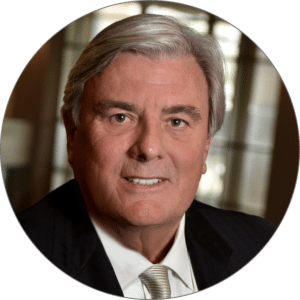
How Derick Ziegler transformed leadership in his organization by acting on employee feedback to build relationships – Part 2
By Neill Marshall, Chairman, HealthSearch Partners and Kurt Mosley, Associations Practice Leader, HealthSearch Partners

Derick Ziegler is an experienced healthcare executive serving more than three decades leading hospitals and health systems. Currently he is Chief Transformation Officer for Baptist Memorial Health Care in Memphis, TN. He has also been the VP, West Tennessee Market, VP, Hospital and Affiliate Integration, Telehealth Executive Sponsor for Baptist Memorial Health Care. Previously he was CEO of Baptist Memorial Hospital in Memphis and CEO of a Baptist hospital in Union City, TN. He also has extensive administration experience in the military health care system serving as Chief of Staff & Deputy Commander for Administration with the Pacific Regional Medical Command in Honolulu, HI and as Chief of Staff/Deputy Commander of Administration for Landstuhl Regional Medical Center in Germany. Ziegler holds a Master of Healthcare Administration degree from Baylor University, and a Master of Social Work degree from the University of Pittsburgh. He also holds a Bachelor of Science degree from the University of Pittsburgh.
Continuing our series on CEOs’ impactful first 90-day strategies, we bring you part 2 of Derick Ziegler’s unique and immersive approach to connecting with frontline staff through job shadowing. Ziegler, a seasoned healthcare executive with a background in military leadership, recognized early in his career the importance of building relationships from the ground up. This article highlights Ziegler’s commitment to listening to employee feedback and delivering results.
Building Engagement From Personal Connections: Creating Bowling Leagues And Wellness Programs
The personal connections Ziegler formed during job shadowing led to initiatives that improved employee morale and engagement. He established an Employee Advisory Group (EAG), composed of selected frontline staff, to provide direct input into organizational decisions. One of the EAG’s early suggestions was to create more opportunities for team building and wellness. This led to the formation of a hospital-wide bowling league and softball teams. “It was amazing to see leaders and frontline staff bonding in a different environment, sharing laughs, and building stronger relationships,” Ziegler shared.
The positive morale shift was evident, with staff reporting a greater sense of connection to the organization. The EAG also helped create a wellness program, which included an on-site gym and walking routes throughout the hospital—a direct result from feedback from the job shadowing sessions.
Amplifying The Employee Voice: Do You Have A Suggestion?
Another key outcome of Ziegler’s first 90 days was the launch of a formal Employee Suggestion Program. Listening closely to employees’ concerns during his shadowing sessions, he realized there needed to be more opportunities for staff to provide feedback. The suggestion system he created enabled staff to submit suggestions online or through a dropbox, with a commitment to review each idea in weekly C-suite meetings.
This transparency in the decision-making process encouraged staff as they could see their suggestions taken seriously. “It wasn’t just about collecting ideas; it was about creating a feedback loop,” Ziegler explained. If we couldn’t implement a suggestion, we made sure to explain why. This commitment to being open built trust and reinforced that every voice was valued.”
The Ripple Effect: Long-Lasting Cultural Change
The impact of Ziegler’s approach extended well beyond his tenure. Years after leaving the hospital, he still hears from former employees who fondly remember the time he spent shadowing them. “It’s not often that the CEO steps into your shoes,” one employee shared. “It showed me that leadership isn’t just about making decisions from a boardroom—it’s about understanding the people who make those decisions daily.”
Ziegler’s job shadowing became a cultural touchstone, inspiring future leaders to adopt similar practices. He notes that many of the CEOs who reported to him incorporated their versions of shadowing into their routines. “It’s gratifying to see the practice live on,” Ziegler said. “It’s a simple, yet powerful way, to build connections and make informed decisions that resonate throughout the organization.”
A Blueprint for Engaged Leadership
Derick Ziegler’s 90-day strategy is a compelling example of how deep engagement with frontline staff can transform an organization. He created a culture of trust, ownership, and continuous improvement by prioritizing genuine connection, listening actively, and acting swiftly on feedback.
As Ziegler reflects on his experience, he offers this advice to aspiring leaders: “Never underestimate the power of getting down in the trenches and connecting directly with front line staff. When you show that you’re willing to do the work, you earn respect and trust that no amount of boardroom meetings can buy.”
Stay tuned for more insights as we continue exploring the innovative tactics used by healthcare leaders to make their first 90 days count.
If you have adopted this tactic, or any others featured in this series, we’d love to hear from you. Please contact us to share your story.






